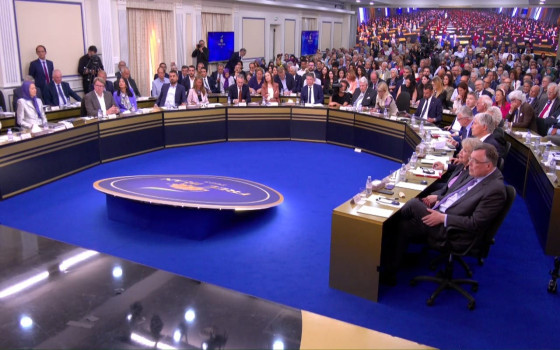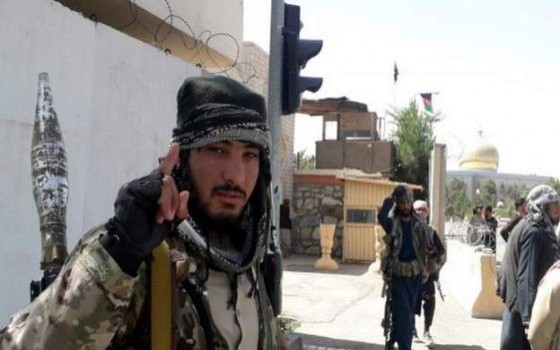
Free Iran Conference: Regime Change Is the Only Solution to Stop Nuclear Ambitions and Threats to Regional Stability

- Europe and Arabs
- Sunday , 1 June 2025 8:7 AM GMT
Paris: Europe and the Arabs
Prominent politicians and parliamentarians from European countries such as Germany, Italy, Spain, the Netherlands, Scotland, Ireland, Norway, Iceland, Portugal, Malta, Romania, and representatives from Argentina expressed their strong support for the National Council of Resistance of Iran (NCRI). They endorsed the NCRI's ten-point plan for establishing a democratic, secular, and nuclear-weapon-free Iran, considering it the appropriate alternative to the current theocratic regime. This came at the Free Iran 2025 conference held in Paris yesterday, Saturday, May 31, 2025. According to a statement distributed by the NCRI, a copy of which we received, the conference, titled "Broad Parliamentary Support for the Iranian Resistance," was endorsed by more than 300 parliamentarians from the German Bundestag, a cross-party parliamentary majority in Italy, and representatives from Norway, Malta, Iceland, Moldova, Costa Rica, Yemen, the Netherlands, and the Irish Senate. These leaders condemned Iran's appalling human rights record, citing repeated executions and repressive laws such as the "Hijab and Chastity" law. They contrasted this with the democratic opposition's call to abolish executions, reject the imposition of the hijab, and establish a democratic republic.
The delegates criticized the Iranian regime's reliance on proxy groups, which they described as decrepit, and denounced the policy of appeasement, which they deemed ineffective. They affirmed the Iranian people's right to overthrow the regime, supported resistance units in their confrontation with the Iranian Revolutionary Guard Corps (IRGC), and urged its designation as a terrorist organization.
Maryam Rajavi's Keynote Address
Maryam Rajavi, President-elect of the National Council of Resistance of Iran (NCRI), delivered a keynote address attended virtually by thousands of members of the People's Mojahedin Organization of Iran (PMOI/MEK). She highlighted the regime's unprecedented vulnerability, noting the loss of its influence in Syria—where it has deployed more than 100,000 fighters—and the collapse of its strategic proxy despite its arsenal of 150,000 missiles. Rajavi described Iran's internal crises as a "tsunami" of political unrest, economic collapse, and growing public discontent. With more than 90% of Iranians abstaining from the regime's elections, the people clearly demonstrated their rejection. She highlighted the ongoing protests and strikes in 152 cities across 30 provinces, particularly the nationwide truck drivers' strike. "These drivers, who are demanding their basic rights, are facing arrest and repression," she said. She urged the Iranian people to support the movement, demanding the immediate release of the detained drivers. "Their voices express the suffering of millions plundered by this regime." Rajavi also exposed the regime's economic mismanagement, with major financial institutions facing collapse despite substantial oil revenues. Severe electricity and natural gas shortages have disrupted daily life, closing schools and universities, and laying off workers. She noted that the regime has squandered more than $2 trillion on nuclear projects, while less than 2% of Iran's electricity is generated from nuclear power. The Nuclear Threat and the Way Forward
Rajavi warned that the regime faces a crucial dilemma on the nuclear issue: abandoning uranium enrichment will undermine its authority, while continuing to pursue nuclear weapons threatens disastrous consequences. She said, "The regime has tied its survival to its nuclear ambitions, terrorism, and military expansion. The only solution is regime change led by the Iranian people and their Resistance."
Rajavi called on the international community, particularly Europe, to designate the Revolutionary Guards as a terrorist organization, recognize the Iranian people's struggle to overthrow the regime, and support the resistance units in their confrontation with the IRGC. She emphasized that "Iran's freedom is the cornerstone of peace and security in the region and beyond."
European Calls for Action
Carsten Müller, a member of the German Bundestag from the Christian Democratic Union party, led the German delegation and called for a firm policy toward Iran. He said, "The new German government must support the Iranian people and the NCRI's ten-point plan for establishing a democratic, nuclear-weapon-free Iran." He urged designating the Revolutionary Guard Corps as a terrorist organization and activating the snapback mechanism to reimpose UN sanctions, warning, "We cannot allow the regime to possess nuclear weapons."
Italian MP Nike Gruppioni supported this call, emphasizing the need for a new approach to Iran. She said, "The regime is at its weakest point. It's time to support the Iranian people and their organized resistance led by Maryam Rajavi." She called for designating the Revolutionary Guard Corps as a terrorist organization and dismantling Iran's nuclear program to prevent a global security crisis.
Message to the Arab World
The Free Iran 2025 conference sent a clear message to the Arab world: The current Iranian regime fuels instability in the region through its support for proxy militias and its ongoing aggression. The NCRI's vision of a democratic Iran free of nuclear ambitions and sectarian violence aligns with the aspirations of Arab nations for peace and stability. By supporting the Iranian people's struggle, the region can move toward a future free from the shadow of Iranian theocracy.












No Comments Found